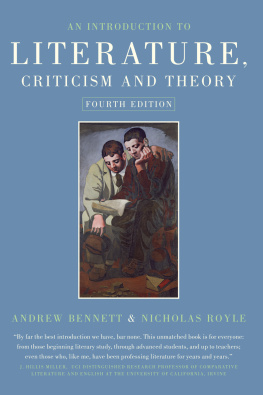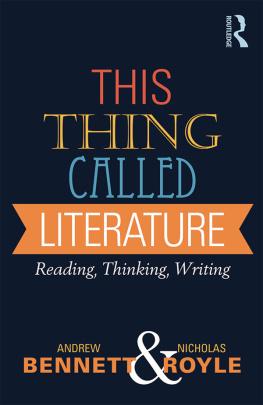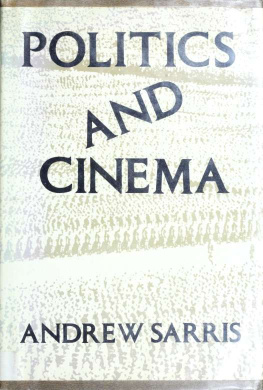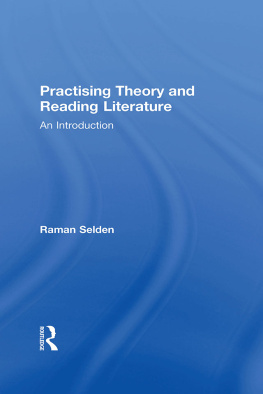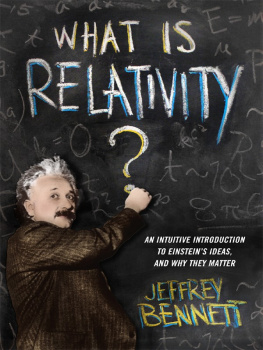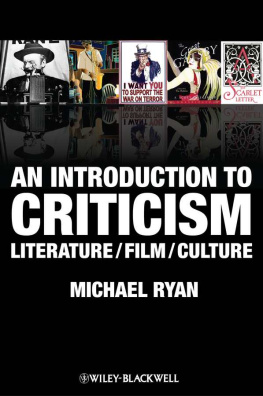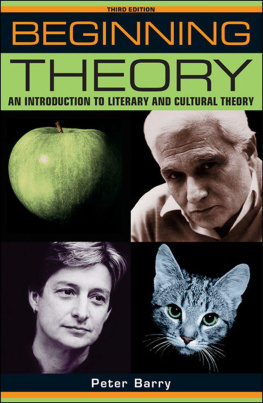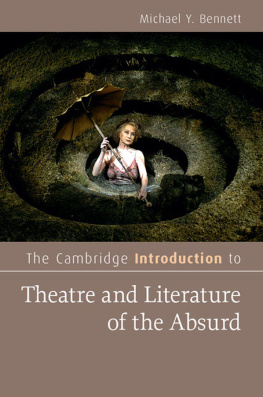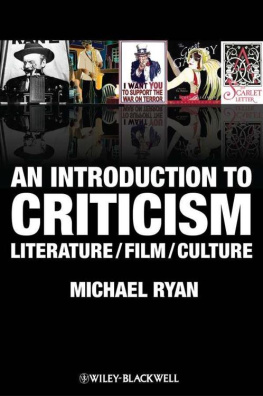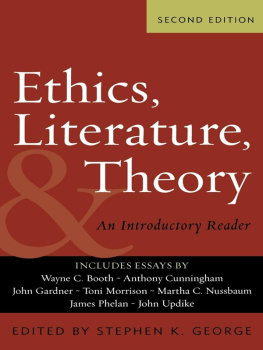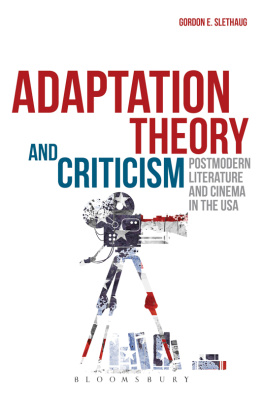Bennett Andrew - An Introduction to Literature, Criticism and Theory
Here you can read online Bennett Andrew - An Introduction to Literature, Criticism and Theory full text of the book (entire story) in english for free. Download pdf and epub, get meaning, cover and reviews about this ebook. City: Abingdon;Oxon, year: 2014, publisher: Taylor and Francis;Routledge, genre: Art. Description of the work, (preface) as well as reviews are available. Best literature library LitArk.com created for fans of good reading and offers a wide selection of genres:
Romance novel
Science fiction
Adventure
Detective
Science
History
Home and family
Prose
Art
Politics
Computer
Non-fiction
Religion
Business
Children
Humor
Choose a favorite category and find really read worthwhile books. Enjoy immersion in the world of imagination, feel the emotions of the characters or learn something new for yourself, make an fascinating discovery.
- Book:An Introduction to Literature, Criticism and Theory
- Author:
- Publisher:Taylor and Francis;Routledge
- Genre:
- Year:2014
- City:Abingdon;Oxon
- Rating:4 / 5
- Favourites:Add to favourites
- Your mark:
- 80
- 1
- 2
- 3
- 4
- 5
An Introduction to Literature, Criticism and Theory: summary, description and annotation
We offer to read an annotation, description, summary or preface (depends on what the author of the book "An Introduction to Literature, Criticism and Theory" wrote himself). If you haven't found the necessary information about the book — write in the comments, we will try to find it.
An Introduction to Literature, Criticism and Theory — read online for free the complete book (whole text) full work
Below is the text of the book, divided by pages. System saving the place of the last page read, allows you to conveniently read the book "An Introduction to Literature, Criticism and Theory" online for free, without having to search again every time where you left off. Put a bookmark, and you can go to the page where you finished reading at any time.
Font size:
Interval:
Bookmark:

An exceptional book. It is completely different from anything else currently available, refreshing, extremely well-written and original in so many ways It is just the sort of book I would want my students to read It is quite the best introductory book that I have ever come across. Philip Martin, De Montfort University
Fresh, surprising, never boring, and engagingly humorous, while remaining intellectually serious and challenging This is a terrific book, and Im very glad that it exists. Peggy Kamuf, University of Southern California, Los Angeles
This excellent book is very well-written and an outstanding introduction to literary studies. An extremely stimulating introduction. Robert Eaglestone, Royal Holloway College, University of London
I am convinced that Bennett and Royle have written a pathbreaking work and I suspect that this book so full of laughter, suspense, secrets and pleasure will have an appeal beyond a strictly academic audience. Alan Shima, University of Gothenberg
All the chapters in the volume are illuminating, informative and original. Robert Mills, Kings College London
Bennett and Royle offer a different kind of introduction, which directly involves the reader in the problems and pleasures of thinking about literature its distinctiveness, its strangeness, its power, its inexhaustibility They succeed brilliantly in encouraging readers who are new to theory to appreciate its importance, enjoy its revelations, and understand some of its conceptual apparatus without diminishing the centrality of literary writing itself. This is a book which students in every introductory course on criticism and theory would benefit from having. Derek Attridge, University of York
The best introduction to literary studies on the market Jonathan Culler, Cornell University
The most un-boring, unnerving, unpretentious textbook Ive ever come across Elizabeth Wright, University of Cambridge
It is by far the best and most readable of all such introductions that I know of The treatment of the various topics is masterful, even-handed and informative. I cannot think of a better introduction for undergraduates, to be sure, but for many graduate students too. Hayden White, University of California at Santa Cruz
I dont know of any book that could, or does, compete with this one. It is irreplaceable Richard Rand, University of Alabama
[Bennett and Royle have] cracked the problem of how to be introductory and sophisticated, accessible but not patronising. Peter Buse, English Subject Centre Newsletter
This excellent book is very well-written and an outstanding introduction to literary studies. An extremely stimulating introduction. Robert Eaglestone, Royal Holloway, University of London
Bennett and Royle offer a different kind of introduction, which directly involves the reader in the problems and pleasures of thinking about literature its distinctiveness, its strangeness, its power, its inexhaustibility They succeed brilliantly in encouraging readers who are new to theory to appreciate its importance, enjoy its revelations, and understand some of its conceptual apparatus without diminishing the centrality of literary writing itself, This is a book which students in every introductory course on criticism and theory would benefit from having. Derek Attridge, University of York
I am convinced that Bennett and Royle have written a pathbreaking work and I suspect that this book so full of laughter, suspense, secrets and pleasure will have an appeal beyond a strictly academic audience. Alan Shima, University of Gothenburg
All the chapters in the volume are illuminating, informative, and original. Robert Mills, Kings College London
An Introduction to Literature, Criticism and Theory
Fourth edition
ANDREW BENNETT AND NICHOLAS ROYLE

First published in 1960
Fourth edition published in Great Britain in 2009 by Pearson Education Limited
Published 2014 by Routledge
2 Park Square, Milton Park, Abingdon, Oxon OX14 4RN
711 Third Avenue, New York, NY, 10017, USA
Routledge is an imprint of the Taylor & Francis Group, an informa business
International Book Distributors Limited 1995
Andrew Bennett (1960) and Nicholas Royle (1957) 1995, 2009
The rights of Andrew Bennett and Nicholas Royle to be identified as authors of this work have been asserted by them in accordance with the Copyright, Designs and Patents Act 1988.
All rights reserved. No part of this book may be reprinted or reproduced or utilised in any form or by any electronic, mechanical, or other means, now known or hereafter invented, including photocopying and recording, or in any information storage or retrieval system, without permission in writing from the publishers.
Notices
Knowledge and best practice in this field are constantly changing. As new research and experience broaden our understanding, changes in research methods, professional practices, or medical treatment may become necessary.
Practitioners and researchers must always rely on their own experience and knowledge in evaluating and using any information, methods, compounds, or experiments described herein. In using such information or methods they should be mindful of their own safety and the safety of others, including parties for whom they have a professional responsibility.
To the fullest extent of the law, neither the Publisher nor the authors, contributors, or editors, assume any liability for any injury and/or damage to persons or property as a matter of products liability, negligence or otherwise, or from any use or operation of any methods, products, instructions, or ideas contained in the material herein.
British Library Cataloguing in Publication Data
A catalogue record for this book is available from the British Library
Library of Congress Cataloging-in-Publication Data
Application submitted
ISBN-13: 978-1-4058-5914-1 (pbk)
Set by 35 in 11/13pt Bulmer MT
Contents
W e are grateful to Michael Ayres for permission to reproduce his poem Bittersweet published in Poems, 19871992 by Odyssey Poets.
In some instances we have been unable to trace the owners of copyright material and we would appreciate any information that would enable us to do so.
T his is a new kind of book. It offers new ways of thinking about literature and about what is involved in reading critically. It is designed to be clear and accessible to those who are beginning to study literature, as well as to more advanced students. Although written with university students in mind, we dare to hope that it might also be of interest to other readers.
Literary theory is an unavoidable part of studying literature and criticism. But theory especially when it takes the form of isms can often be intimidating or else, frankly, boring. We have tried to avoid simply giving potted summaries of isms. Instead we present brief essays on a range of key critical concepts all of which have more or less familiar names. We put these concepts into practice through readings of particular literary texts. Our primary focus, in other words, is on what is powerful, complex and strange about literary works themselves. Our aim is to explain, entertain, stimulate and challenge.
The book is divided into 24 chapters and looks as if it has a certain order or progression. It begins with The beginning and ends with The end. But it has been put together in such a way that it can also be read starting from any one chapter. The end, for example, is not a bad place to begin. Each chapter concludes with some suggestions for further reading. There is a glossary of critical and theoretical terms at the back of the book, plus a full bibliography of the texts discussed.
Next pageFont size:
Interval:
Bookmark:
Similar books «An Introduction to Literature, Criticism and Theory»
Look at similar books to An Introduction to Literature, Criticism and Theory. We have selected literature similar in name and meaning in the hope of providing readers with more options to find new, interesting, not yet read works.
Discussion, reviews of the book An Introduction to Literature, Criticism and Theory and just readers' own opinions. Leave your comments, write what you think about the work, its meaning or the main characters. Specify what exactly you liked and what you didn't like, and why you think so.

